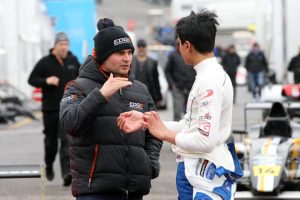
Phil Glew, 2009 Clio Cup GB champion and sometime BTCC racer, is the man behind Enaam Ahmed and Jamie Caroline, two teenagers who are making inroads on the path to F1.
Ahmed dominated the BRDC British Formula 3 championship this year, with Caroline showing a similar level of performance in British Formula 4. Their achievements have been recognized by places in the finals of two prestigious young driver awards, in the case of the McLaren Autosport BRDC Award for Ahmed, and the Porsche Scholarship program for Caroline.
Glew’s single-seater career peaked when he finished second in Formula BMW UK in 2004, but he’s more commonly known today as the voice of ITV4’s British F4 coverage.
He is also chief driver coach at EDGE Sporting Management, a driver management business that owes its existence partly to the success of a young Ahmed.
In 2008, Glew’s business partner at EDGE Sporting Events, Chris Panayiotou, helped his friend Shami Ahmed get his son into karting.
Occasional GT drives filled Glew’s racing schedule over the next few years, while the younger Ahmed started to impress on the British karting circuit.
When Ahmed looked at stepping up to racing cars, Glew became his de facto driver coach and EDGE Sporting Management was created.
EDGE Sporting Management
Phil Glew: Chief Driver Coach
Former BTCC racer turned driver coach and commentator, integral in the success of Enaam Ahmed, Jamie Caroline and more
Chris Panayiotou: Investment advisor and driver coach
Former Clio and VW Cup driver, stockbroking experience has enabled him to open up doors for sponsorship
Eddie Reynolds: Sponsorship and logistics
Helped Glew into Clios, experienced in finding sponsorship and running events
That was in 2014, the year in which Ahmed went on to become the World and European Junior Karting champion.
That same year a young Jamie Caroline, son of successful club racer Lee, stepped up to Ginetta Juniors and also caught Glew’s eye, starting a successful partnership that lasts to this day.
Although Glew’s racing career didn’t take off after his FBMW or Clio Cup success, Ahmed and Caroline are likely to follow their British F3 and F4 titles with drives in Europe for 2018.
Ahmed and Caroline are in no denial that Glew, and his colleagues at EDGE, have been instrumental to their recent success.
“He’s been working with me for four years now, and I consider him like family,” said Caroline.
“I’ve got a lot of respect and a lot of love for Phil.”
Ahmed believes EDGE are “the best in the business” and taught him “how to succeed when times were tough”.
This period in question was at the beginning of Ahmed’s car racing career in British F4, then known as MSA Formula.

Alongside his successful karting campaign, Ahmed and Glew were testing a Ginetta Junior car on the tracks used in the TOCA championships, with the intention of learning the circuits ahead of the move up to F4.
Ahmed “knew the tracks inside out” once he’d tested on them all, but found the actual step up to racing the Mygale chassis used in British F4 far more difficult.
“He just took a little bit longer to get used to a single-seater and I think, to be fair to him, and he’ll agree, is that because he became World Karting champion, he felt like he should’ve been better than he was,” according to Glew.
“Therefore he probably didn’t put the effort in that he should’ve done, and he will quite happily admit that.”
In the first half of the season Ahmed’s best finish was seventh, although rather impressively he only had one non-finish despite the inevitable roughness of the racing in the entry level single-seater series.
“We worked hard all that season in his first season in F4 when he was with Arden.
“About halfway through we made a bit of a breakthrough because we did some stuff in Caterhams and Ginetta Juniors. I could sit with him again.”
Single-seaters deny Glew the chance to sit next to the drivers he’s coaching, and once he could get back in the car with Ahmed, the results improved.
“He came back after the break and from then it was like: ‘Right, now we’ve got something’. He started getting podiums, and then he won his first race at Brands GP.”
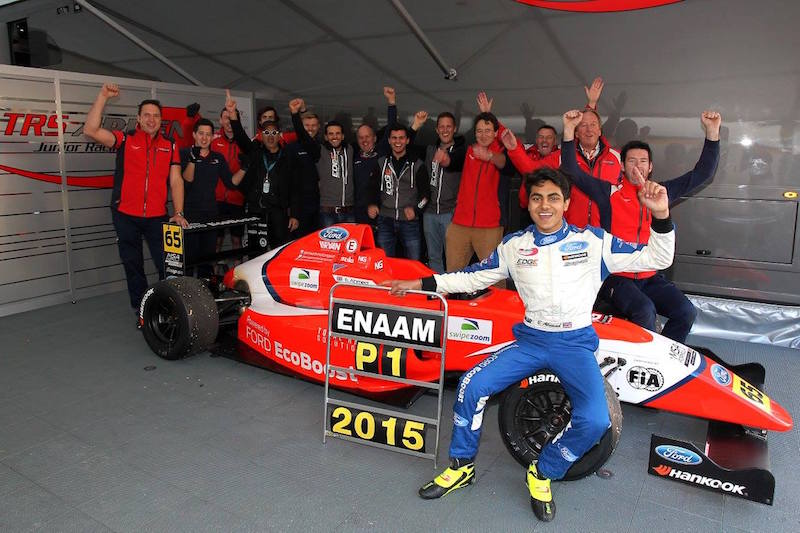
Ahmed ended the season in eighth, while a part-season in SMP F4 resulted in five victories, and he won his first car racing trophy in the sister Koiranen-ran Winter Junior Challenge.
That championship awarded £75,000 towards a season in F4.
Ahmed chose to move up to BRDC British F3 instead, meaning he was unable to use the prize money.
“In hindsight we probably should have done another year in F4,” says Glew. “But what we ended up doing was going on and doing F3.
“He was strong, he won a race. But any series like that one makes you need to do two years. And that’s why he stayed on for a second year in F3, because he didn’t stay on for a second year in F4.”
This year Ahmed has “killed the opposition” in British F3, winning 13 races and wrapping up the title with three races to spare.
Glew has not been involved though, as Ahmed split with EDGE at the beginning of the year and started a partnership with Brazilian driver coach Roberto Streit.
“It was a lot of hard work, and we were always trying to help his dad because he was not always financially in a position to go with the best. We’ve helped him get the right deals in the right places, and when he put him in SMP F4 it was more experience for him in his first year of cars, and it helped him massively.
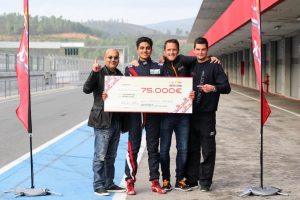
“That’s how it all started: my business partner got him into karts, I got him into cars, and you’ve got to eventually spread your wings and do your own thing and that’s what him and his dad have felt like doing, and it works for all of us.”
Alongside his British F3 exploits, Ahmed has also gained experience in Euroformula Open and the Toyota Racing Series, in which he won a race and finished sixth in this year’s standings. On December 3rd he could add MABA winner to that list of achievements.
As much as Ahmed is grateful for the input Glew has made to get him this far, Glew is also thankful that working with the Londoner gave him the opportunity to meet Caroline.
Caroline missed out on a spot as one of the MABA finalists, some would consider rather cruelly, and lost out on the main prize in the Porsche scholarship, but Glew believes that the reigning British F4 champion has what it takes to get to the top regardless.
The partnership between the pair started when Caroline entered the Ginetta Junior championship in 2014, and Glew took over management of the young driver when he moved to the crack HHC Motorsports team for his second season in the category.
Caroline won 10 of the 20 races, but remarkably only won the the title on win countback once dropped points were incorporated.

The step-up to F4 didn’t quite go to plan either, with initial team Jamun folding after four rounds. Caroline found a seat at Fortec, and managed to end the season 10th in the standings after taking his first win in the final round at Brands Hatch.
“The main thing with Jamie is he’s quite the opposite to Enaam,” explains Glew.
“Enaam thinks about it a lot and eventually he can get to the same pace as the frontrunners. But with Jamie he’s already got the natural ability. He’s got so much natural talent and he’s so naturally gifted and very fast, it’s actually going the other way.”
This requires an entirely different style of coaching, which going off Caroline’s results, has been a success.
“It’s actually sort of bringing him back a little bit, and getting into his head and making sure that we’re rounding off the edges. It’s just perfecting a very fast driver, and making sure he doesn’t make the silly mistakes.
“He doesn’t need to win every race, but he’s capable of it. As he’s proved this year, he’s won ten races. He probably should’ve won another one here at Silverstone. It’s not important though.
“The important bits are making sure that he’s doing all the right things at the right time so that we can develop a career for him.”
This is an idea integral to Glew’s approach when looking after young drivers. There is more to be gained from being a career driver than endlessly chasing Formula 1.
“For me, I’m always thinking about the next step. I’m always looking at trying to make sure he has a career in the sport year after year, rather than just trying to make sure that we win this [British F4] championship.
“Even though I couldn’t make it all the way to the top in anything I’ve done, I’ve still developed quite a good career in it. I’ve done a lot of stuff in a lot of different disciplines of the sport. So them [the young drivers] making a career of the sport is what matters at the end of the day.
“It’s them having a living in the sport and doing something they love.”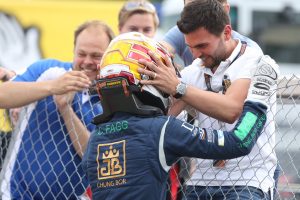
Glew’s style of coaching has also needed to change as his proteges, including GT4 star Charlie Fagg (pictured above), have become more experienced.
“[With Jamie] it’s less involved than it used to be because before it was teaching him the more basic stuff. Now he’s one of the best drivers in this [TOCA] paddock, out of any category. It’s not a case of having to teach him how to drive and stuff like that, it’s more about trying to make sure that he thinks about getting the points when he can’t win, the championship [situation] and the media side of things.”
Two of the points Glew mentions are more heavily tied to the mental capacity and attitude of his young drivers, rather than their ability on track, and because of Glew’s continued commitments to Ginetta Junior, his time with Caroline to work on these aspects has been greatly reduced.
The solution was to place the 18-year-old at Carlin, a team renowned for honing young drivers.
“We put him with Carlin purely because they’ve won the last two championships, I knew that they would be the right people to be around him to make sure he does the right job.
“And on the coaching side, the engineers and the team managers at this team have done it all. They’ve been with about every best driver, so they know how to look after someone as good as Jamie.”
Glew is also working hard on coordinating Caroline’s 2018 programme.

“I would say it would be very hard to get all the way to the top in single-seaters. Unfortunately this sport is very expensive, and it’s all down to the finances.
“But, we’re in the middle of trying to get Jamie up to the next step, which is probably going to be higher than what he expects. We’d like him to go into GP3, I think that’s more realistic for his age.”
A step up to GP3 would make Caroline ineligible for MABA nomination in 2018, but a move to EF Open or British F3, both of which he has already tested in, could make him one of the favourites if he has another strong season.
Ginetta Junior has been the first step in car racing for countless drivers, including Caroline, as well as several sportscar stars. McLaren reserve driver Lando Norris raced in the championship in 2014, finishing third in the standings with four wins, and looks set to make his F1 debut in the not too distant future.
For Glew, working with, or arguably creating, the next Lando Norrises, Enaam Ahmeds and Jamie Carolines is the best part of the job.
“That’s where they all start now, it’s Juniors or F4.
“I work with both categories because they’re the ones that take the drivers out of karting. I look after Ginetta Junior drivers and I’ll probably end up bringing some of them to F4, for next year.
“It’s exciting. Dealing with, helping people’s careers at the age of 14-18, it’s the time when they’re like a sponge. They take on all that information and you can mould them into something you need them to be. You’re basically getting a fresh piece of canvas.
“Sometimes, when they’ve done a lot of karting, it’s actually quite hard [to coach them]. Bit like with Enaam, it was hard to get rid of some of the bad habits from karting, because he’d done so much of it. And then to make him into a car racer, rather than a kart racer.
“But it’s part of the challenge and that’s what I enjoy about it.”
Very rewarding? “Oh yeah.”
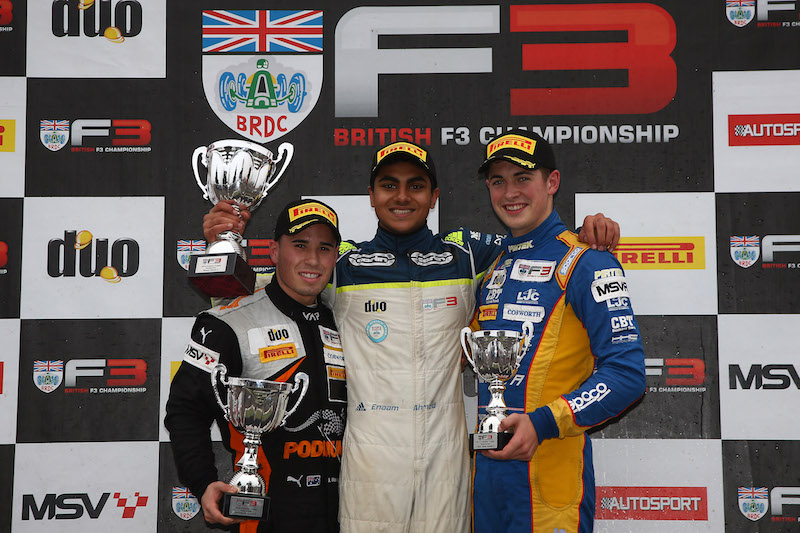
If Glew is moulding drivers to his own taste, it raises the question if it is a showcase of his own talent, as much as it is a showcase of the talent of the drivers he works with.
“I don’t really look at it like that. I just think of it as: I do my job, if I do my job right the driver will be fast. And the driver will win races and win championships. I don’t really look at it as in, it’s to benefit me, because I’m just doing my job.
“It’s nice, don’t get me wrong. It’s very satisfying. It’s almost as satisfying as winning a race yourself; seeing one of your drivers that you’ve helped, win a race. Or win a championship or be on the podium. It’s an emotional sport as it is.
“When you see young kids developing and improving and getting the results that they deserve, it is very very satisfying.”
Ahmed is one of the four MABA finalists for 2017, with EF Open champion Harrison Scott, Eurocup Formula Renault rookie champion Max Fewtrell and Macau Grand Prix winner Dan Ticktum being the other three.
“[MABA] is the ultimate. It’s something that I always wanted to try and win myself,” admits Glew.
“I came close to being nominated when I did FBMW. I finished second in the championship so therefore I didn’t. And it’s quite upsetting not being nominated.
“So my ultimate goal now would be firstly, to get drivers nominated for it, and then for one of them to win it. And that’s what I would love more than anything. It would be literally the icing on the cake.”
AUTOSPORT says…
Formula Scout chatted to James Newbold, AUTOSPORT’s Performance Editor, ahead of the Autosport Awards, on why driver coaches are so important for young drivers
“In my experience driver coaches have always been a very helpful influence. If you look at the kind of people who are using driver coaches, they’re primarily the young drivers who are looking to go up the ladder, and make a career out of motorsport.
“A driver coach is useful to them because they can learn from the mistakes that the more experienced driver made in their youth, and they can pass those on to help shortcut the learning curve. They can go through data with them, show them areas where they’re going wrong, they can keep them calm in [high] pressure situations. And generally just improve their performance, and make them a more refined driver and a more consistent driver.
“[During the MABA testing process] you obviously wouldn’t be working with your driver coach on the day because you’re very much thrust into it and expected to sink or swim.
“It certainly wouldn’t do any harm [having a driver coach], because especially at the age of these young drivers, it’s all about who’s mature enough to cope in these situations. Obviously MABA is a highly prestigious prize, and everybody who was nominated for it wants to win it.
“[MABA] is a high pressure situation that, if you’ve got that mental coaching and you’re able to process things that are happening, [you can perform] more effectively. Some people are just naturally very good at that, but for anybody who isn’t, a driver coach is a very good way of reducing the learning curve. Having someone who can share their experiences, and also having an experienced head to rely on.
“Often if you’re a young driver, a lot of the experience you’ve had will be from your parents. Sometimes the parents aren’t always the most positive of influence, they’ve invested a lot of money in their career, and they want their child to be successful, but ultimately the advice that they give might not be the best. So if you get another driver in, who has been there and done it, that’s always a useful aspect.”
Further reading
Why Enaam Ahmed feels ready to win a single-seater title (26 May 2017)
Jamie Caroline’s charge to the brink of British F4 glory (14 September 2017)